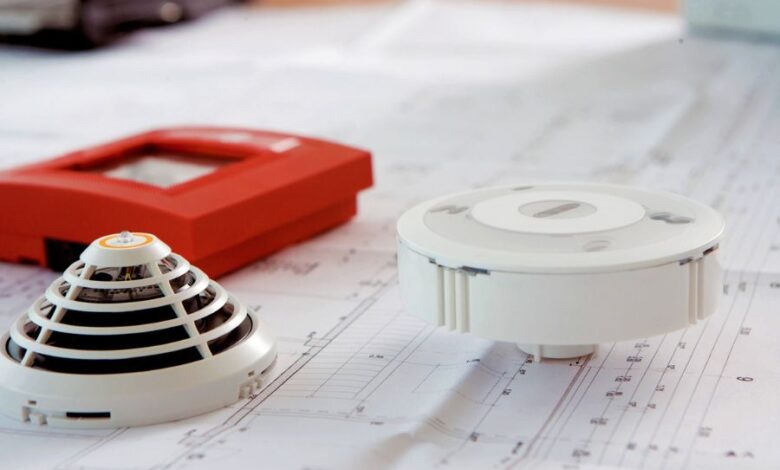What Types of Fire Alarm Systems Fit Commercial Needs?

Safeguarding commercial buildings is crucial. A working fire warning system protects persons, property, and possessions. Due to their size, complexity, and government regulations, retail fire alarm systems differ from domestic ones. Several options exist, making selection difficult. This article discusses commercial fire alarm systems and how to pick the best one.
Conventional Fire Alarm Systems
Traditional fire alarms are basic. The building is divided into regions linked to a central control panel. In case of fire or smoke, the system alerts first responders to which zone triggered the signal to assist them in determining the cause. Standard systems are inexpensive and straightforward to set up, but they perform best in smaller businesses. They can’t pinpoint dangers in a zone, so they may not be excellent at finding them. Benefits include low cost and easy maintenance. However, they can’t be readily extended, making them unsuitable for large or complex corporate sites. Modest companies with modest offices or stores may benefit from a cost-efficient, effective conventional system.
Addressable Fire Alarm Systems
Addressable fire warning systems provide additional complexity. Smoke alarms and manual call points are located separately, helping the machine locate a defect or fire. These systems are appropriate for moderate to extensive corporate facilities where correct identification may save lives and time. Addressable tools also provide more fantastic choices. They may be modified to match a building’s layout and safety regulations. They also tell the control panel when to maintain the device, making it more dependable. Because they are precise, expandable, and offer more functions, they are excellent for contemporary corporate buildings like retail malls, schools, and office complexes while costing more.
Wireless Fire Alarm Systems
Due to their low cable count, modern wireless fire alarm systems are adaptable and quickly installed. Radio waves connect these devices, making them ideal for situations where wiring isn’t practical or would look ugly. Wireless networks benefit historic structures, temporary installations, and remodelling enterprises. Wireless gadgets might cost more than corded ones despite being more apparent. Batteries need frequent maintenance to function. However, modern wireless systems operate as well as programmable ones. Wireless fire alarm systems are ideal for businesses that need a discreet fire alarm. They also simplify installation.
Hybrid Fire Alarm Systems
Hybrid fire warning systems combine wired and cellular components, letting businesses leverage both platforms’ finest features. In busy regions, a hybrid system can employ wired connectivity and wireless devices in remote locations. Hybrid systems are adaptable and may be used in many business circumstances. They aid in large structures with several designs, such as hospitals or multi-story workplaces. Scalable and adaptable hybrid systems can adapt to business demands. They cost more initially, but many businesses find their flexibility and long-term benefits worth it.
Voice Evacuation Fire Alarm Systems
Good communication is crucial when business challenges arise. Voice escape fire alarm systems provide clear safety instructions via recorded or live voice messages. These tactics suit large, bustling settings like stadiums, theatres, and airports. Voice evacuation systems reduce fear and uncertainty, improving crisis safety. They can also make daily statements via public speaking systems. Although they cost more than simple alarm systems, they provide clear, actionable instructions, making them essential for large corporate buildings.
Aspirating Smoke Detection Systems
Aspirating smoke detection systems (ASDs) are sensitive and effective in fast-finding fires. These devices continuously examine air via lines for even the slightest levels of smoke. For speedy action, use ASDs in critical corporate areas like data hubs, libraries, and labs. ASDs cost more to install and maintain but are dependable and sensitive, making them ideal for asset protection and company stability. They also perform well in challenging environments like high-airflow areas, making them suitable for specific corporate applications.
Considerations for Choosing the Right System
Businesses must consider many factors when purchasing a fire alarm system. Consider the building’s size, layout, usage, and population. A large shopping mall may require an addressable or mixed system, although a small business may not. Fire safety standards are also crucial. Local building codes usually specify minimums for fire alarm systems. Fire safety specialists or licenced installers can help businesses comply with these standards legally. Budget constraints also matter. More expensive dedicated or aspirating smoke alarms may provide better protection. To make a wise choice, you must compare upfront expenses against long-term safety and maintenance demands.
The Role of Maintenance and Testing
Even the most significant fire alarm systems need maintenance. Commercial premises require regular audits and testing to meet safety requirements and uncover issues. Sensors, control panels, and other system components need frequent maintenance to perform correctly. Hiring a fire safety service simplifies this procedure. These experts inspect, report, and repair issues rapidly. Maintenance extends the system’s life and offers the company peace of mind regarding fire safety.
Conclusion:
Business fire alarm system selection is crucial. Conventional systems are simple and affordable for limited regions. However, addressable and hybrid systems can manage more extensive or complex configurations.



